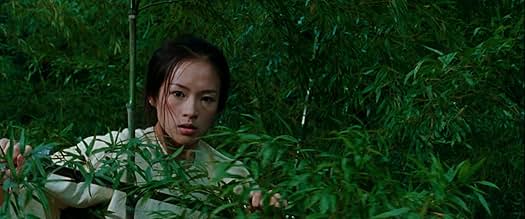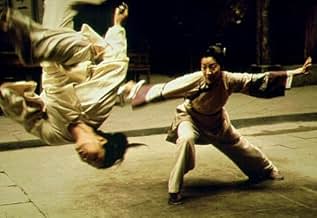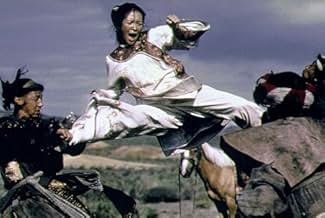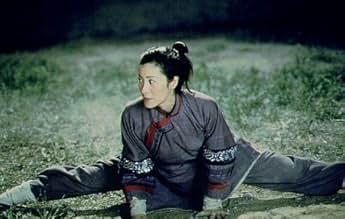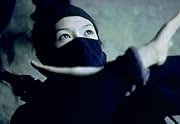Una joven guerrera china roba una espada a un famoso espadachín y huye hacia un mundo de aventura romántica con un misterioso hombre en la frontera del país.Una joven guerrera china roba una espada a un famoso espadachín y huye hacia un mundo de aventura romántica con un misterioso hombre en la frontera del país.Una joven guerrera china roba una espada a un famoso espadachín y huye hacia un mundo de aventura romántica con un misterioso hombre en la frontera del país.
- Dirección
- Guionistas
- Elenco
- Ganó 4 premios Óscar
- 101 premios ganados y 132 nominaciones en total
Chow Yun-Fat
- Master Li Mu Bai
- (as Chow Yun Fat)
Ziyi Zhang
- Jen
- (as Zhang Ziyi)
Pei-Pei Cheng
- Jade Fox
- (as Cheng Pei-Pei)
Deming Wang
- Tsai
- (as Wang De Ming)
Suying Huang
- Auntie Wu
- (as Huang Su Ying)
Jinting Zhang
- De Lu
- (as Zhang Jin Ting)
Jianhua Feng
- Gou Jun Sinung
- (as Feng Jian Hua)
Zhenxi Du
- Shop Owner
- (as Du Zhen Xi)
Cheng Lin Xu
- Captain
- (as Xu Cheng Lin)
Opiniones destacadas
Chinese martial arts films had found a market in the West during the Kung Fu boom initiated by Bruce Lee in the early 1970s
But "Crouching Tiger, Hidden Dragon" represents a new departure, an attempt to produce a sophisticated, big-budget Chinese film that would appeal both to mainstream Western audiences and to audiences in the Far East
Through their quest to find the stolen sword of Green Destiny, warriors Yu Shu Lien (Michelle Yeoh) and Li Mu Bai (Chow Yun-Fat) explore themes of love, loyalty and sacrifice
Ang Lee was an astute choice as director The location shooting was on the Chinese mainland and the actors came from Malaysia, Hong Kong and Taiwan, as well as China Instead of the Shaolin school of martial arts favored by Bruce Lee, Ang Lee opted for the more spiritual form of Wudan; brute force is replace by scenes of balletic grace as opponents climb up walls or flit through tree-tops
The widespread success of the film is a firm indication that Chinese culture is making its mark
Ang Lee was an astute choice as director The location shooting was on the Chinese mainland and the actors came from Malaysia, Hong Kong and Taiwan, as well as China Instead of the Shaolin school of martial arts favored by Bruce Lee, Ang Lee opted for the more spiritual form of Wudan; brute force is replace by scenes of balletic grace as opponents climb up walls or flit through tree-tops
The widespread success of the film is a firm indication that Chinese culture is making its mark
Fans burnt by George Lucas' "Phantom Menace" found solace in Ang Lee's cosily straightforward "Crouching Tiger Hidden Dragon". The film was greeted with a shrug in China (it was a flop), a country desensitised to wuxia tales, but Westerners loved it. Probably because "Tiger" is basically "Star Wars", with its own assortment of bounty-hunters, Jedis, Sith Lords, princesses, rogues, warriors, villains, henchmen, Yodas, fairy tale romances, teachers, masters, apprentices, chosen ones and much vague talk of destiny, fate and "light" and "dark" sides. When he's not indulging in super choreographed action sequences, Lee's aesthetic is also very Lucasy, which is to say, very John Ford, very David Lean, very Kurosawa, with clean lines, big open spaces, and simple but careful shot selection. What's strange is the film's budget. The film looks like it has the budget of one of those big, state backed Chinese or Stalinist productions, but "Crouching" was made for about fifteen million dollars. Lee gets a lot of mileage out of his budget.
Martial arts fans abhor "Tiger". It's too geared to western tastes, too watered down, and China's been churning out similar wuxia for decades. Why should this one get all the credit? But Lee does put his own spin on the material. His film is more sensual, poetic, graceful, romantic, has a mysterious beauty, and is more delicate than is typical of the genre. His female characters are also given a bigger role than is customary and his action at times seems more like expressive dance.
Repression, restrictions, strict moral codes and self-control are an obsession with Lee. With "Hulk" we had a scientist who struggles to curb his anger, his "Taking Woodstock", "Wedding Banquet" and "Brokeback Mountain" revolved around characters repressing their homosexuality, while "Sense and Sensibility", "Lust Caution", "Ice Storm" and "Woodstock" again all hinged on either repression, free expression or the inhibiting of desire. In "Crouching's" case – the title itself refers to "one who has hidden, suppressed talents" - we have a stifled three-way love between characters called Mu Bai, Shu Lien and Jen Yu, all of whom are prohibited from desire by strict moral/social codes, feudal customs and warrior traditions.
The rejection of these codes is perhaps why the film was shunned by China (and is so popular with western women). Chinese mythology, Taoist philosophy and the hokey "mysticism" of Asian martian arts films (akin to "Star Wars'" "The Force"), all stress an esoteric mode of detachment, a form of denial characteristic of Eastern thought in which the world is seen to be illusory and detached cogitation is seen to be the path to enlightenment. Lee, in contrast, is trading in a more genteel, Western sensibility; a kind of romantic humanism where one is called to ditch Eastern stoicism and embrace the "reality" and "meaning" of human attachments in this life. This tug-of-war is epitomised by a trio of conversations located in each of the film's three acts. In the first, characters called Mu Bai and Shu Lien, who we learn have long had feelings for each another but have denied these feelings to pursue the demands of a Wudan warrior lifestyle, discuss the fact that Mu Bai, when meditating, reaches not "the bliss of enlightenment" but "a place of endless sorrow". For Mu Bai, passions cannot be extinguished and only serve to increase the pull of desire. Mu Bai's conflict – the way clinging to personal affection is contrary to his Wudan ways of detachment – can be found even in Lucas' "Star Wars" prequels, only there Lucas has some monastic ninja kid literally moan about the way his calling prevents him from losing his virginity ("Me want make sexy time but Yoda say no! Wah Wah Wah!").
The second conversation occurs at the film's midpoint, when Mu Bai and Shu Lien finally touch. "Shu Lien," he recoils, "the things we touch have no permanence. My master would say there is nothing we can hold onto in this world. Only by letting go can we truly possess what is real." Shu Lien then brushes aside his Taoism with direct, naive realism: "Not everything is an illusion. My hand is real."
It's in the third conversation that the film breaks away from your typical martial arts movie mysticism and repudiates Wudan philosophy. Here, Mu Bai is dying and Shu Lien urges him to meditate: "Free yourself of this world. Let your soul rise to eternity. Do not waste your breath on me." "I have already wasted my life," Mu Bai responds. "I would rather be a ghost drifting by your side, as a condemned soul, than enter heaven without you." Contrast this with the countless marital arts movies, or even the "Star Wars" franchise, which end with the ghostly spirits of dead warriors, monks and masters hovering contently over the living. Mu Bai is given no supernatural reprieve, no higher plane of existence. He just dies. The film then ends with the recounting of a mountain legend in which a young woman must paradoxically "float away and never return" if she wishes to "return". The whole film hinges on a similar paradox: acting on a desire one desires not to have. It's the paradox of Buddhism: continually desiring to eliminate desire, whereby satiating desire is impossible and it is ultimately desire which blocks the road to desirelessness. This is contrasted with a more Western hedonism, where the hedonist attempts the cessation of desire by "giving in" to them all.
Beyond all this, the film resembles the works of King Hu, Ozu and Ichikawa, the latter two only insofar as it contrasts straitjacketed older generations, and their societal obligations, with oppositional, younger generations. The film's ending suggests that a character called Jen sacrifices her life/love so that Mu Bai and Shu Lien may finally be together.
8.5/10 – Worth two viewings.
Martial arts fans abhor "Tiger". It's too geared to western tastes, too watered down, and China's been churning out similar wuxia for decades. Why should this one get all the credit? But Lee does put his own spin on the material. His film is more sensual, poetic, graceful, romantic, has a mysterious beauty, and is more delicate than is typical of the genre. His female characters are also given a bigger role than is customary and his action at times seems more like expressive dance.
Repression, restrictions, strict moral codes and self-control are an obsession with Lee. With "Hulk" we had a scientist who struggles to curb his anger, his "Taking Woodstock", "Wedding Banquet" and "Brokeback Mountain" revolved around characters repressing their homosexuality, while "Sense and Sensibility", "Lust Caution", "Ice Storm" and "Woodstock" again all hinged on either repression, free expression or the inhibiting of desire. In "Crouching's" case – the title itself refers to "one who has hidden, suppressed talents" - we have a stifled three-way love between characters called Mu Bai, Shu Lien and Jen Yu, all of whom are prohibited from desire by strict moral/social codes, feudal customs and warrior traditions.
The rejection of these codes is perhaps why the film was shunned by China (and is so popular with western women). Chinese mythology, Taoist philosophy and the hokey "mysticism" of Asian martian arts films (akin to "Star Wars'" "The Force"), all stress an esoteric mode of detachment, a form of denial characteristic of Eastern thought in which the world is seen to be illusory and detached cogitation is seen to be the path to enlightenment. Lee, in contrast, is trading in a more genteel, Western sensibility; a kind of romantic humanism where one is called to ditch Eastern stoicism and embrace the "reality" and "meaning" of human attachments in this life. This tug-of-war is epitomised by a trio of conversations located in each of the film's three acts. In the first, characters called Mu Bai and Shu Lien, who we learn have long had feelings for each another but have denied these feelings to pursue the demands of a Wudan warrior lifestyle, discuss the fact that Mu Bai, when meditating, reaches not "the bliss of enlightenment" but "a place of endless sorrow". For Mu Bai, passions cannot be extinguished and only serve to increase the pull of desire. Mu Bai's conflict – the way clinging to personal affection is contrary to his Wudan ways of detachment – can be found even in Lucas' "Star Wars" prequels, only there Lucas has some monastic ninja kid literally moan about the way his calling prevents him from losing his virginity ("Me want make sexy time but Yoda say no! Wah Wah Wah!").
The second conversation occurs at the film's midpoint, when Mu Bai and Shu Lien finally touch. "Shu Lien," he recoils, "the things we touch have no permanence. My master would say there is nothing we can hold onto in this world. Only by letting go can we truly possess what is real." Shu Lien then brushes aside his Taoism with direct, naive realism: "Not everything is an illusion. My hand is real."
It's in the third conversation that the film breaks away from your typical martial arts movie mysticism and repudiates Wudan philosophy. Here, Mu Bai is dying and Shu Lien urges him to meditate: "Free yourself of this world. Let your soul rise to eternity. Do not waste your breath on me." "I have already wasted my life," Mu Bai responds. "I would rather be a ghost drifting by your side, as a condemned soul, than enter heaven without you." Contrast this with the countless marital arts movies, or even the "Star Wars" franchise, which end with the ghostly spirits of dead warriors, monks and masters hovering contently over the living. Mu Bai is given no supernatural reprieve, no higher plane of existence. He just dies. The film then ends with the recounting of a mountain legend in which a young woman must paradoxically "float away and never return" if she wishes to "return". The whole film hinges on a similar paradox: acting on a desire one desires not to have. It's the paradox of Buddhism: continually desiring to eliminate desire, whereby satiating desire is impossible and it is ultimately desire which blocks the road to desirelessness. This is contrasted with a more Western hedonism, where the hedonist attempts the cessation of desire by "giving in" to them all.
Beyond all this, the film resembles the works of King Hu, Ozu and Ichikawa, the latter two only insofar as it contrasts straitjacketed older generations, and their societal obligations, with oppositional, younger generations. The film's ending suggests that a character called Jen sacrifices her life/love so that Mu Bai and Shu Lien may finally be together.
8.5/10 – Worth two viewings.
Crouching in the shadows, hiding in the dark, entangled with emotion, an unobtrusive heart, waiting for a moment that may never be revealed, the chance to draw back shades, unlock its passions, remove its seals.
Seamlessly flowing like water over weathered stone, as elegant and enchanting a tale of right verses wrong, good verses bad, learning and forgiving as you'll likely find. The cinematography is sublime, the acting and performances as good as they get, the message as simple as any placed on a screen. Immerse yourself in a truly wonderful piece of cinema that perpetually stands the test of time.
Seamlessly flowing like water over weathered stone, as elegant and enchanting a tale of right verses wrong, good verses bad, learning and forgiving as you'll likely find. The cinematography is sublime, the acting and performances as good as they get, the message as simple as any placed on a screen. Immerse yourself in a truly wonderful piece of cinema that perpetually stands the test of time.
Less than half an hour into the viewing of this masterpiece I knew this would become one of my favorite films - of all time. Only in my wildest dreams (quite literally, this movie has touched me on a personal level) have I visualized such fantastic and precise choreography, so captivating that to take your eyes away during the intense confrontations is to deny yourself the essence of what makes this film so wonderful.
With an artistic license unprecedented, the action scenes are entirely unbelievable but purely the work of a fabulous imagination. The magical settings and the colorful characters fit well into the plot but you will take away the breath-taking martial arts sequences.
With an artistic license unprecedented, the action scenes are entirely unbelievable but purely the work of a fabulous imagination. The magical settings and the colorful characters fit well into the plot but you will take away the breath-taking martial arts sequences.
As a film student living in Toronto, I look forward to the Toronto International Film Festival every year. Last year, the highlight of the festival for me was American Beauty. This year, it would have to be (so far) Ang Lee's "Crouching Tiger, Hidden Dragon".
Being of Asian descent, I've seen my share of wu xia genre movies to last me a life time. However, most of them are so centred on the fighting, that they forget the rest of the elements that are involed. The movie turns into one long scripted fighting scene with maybe a slight hint of story. Crouching Tiger, on the other hand realizes these issues, and builds these oh-so entertaining action sequences into an epic with typical asian themes such as true love and honour.
Being an epic, one would expect the usual long takes and establishing shots, and boy does it ever look beautiful. Traversing through a myriad of regions spanning the lengh of China (from the deserts to bamboo forests, to mountains high in the clouds), the film soley based on its asthetic properties is nothing short of stunning. The lighting of different landscapes and the exquisitly designed costumes all radiate with stunning colour. And then there's the cinemetography. Wow! The backdrops, establishing shots look absolutely marvelous. If your jaw dropped when you saw Rome and its coliseum in Gladiator, wait until you see ancient Beijing recreated on the screen!
Okay, so it's a good looking movie. What about the story? The complexity of the plot is rather sparse, probably reminiscent of epics such as Braveheart or Gladiator, which is by no means a bad thing. Although both Chow Yun Fat and Michelle Yeo did have major parts, this movie belongs mostly to Zhang Ziyi who IMHO did an amazing job playing a very complex role (one which required her to represent nobily as a princess, naivness, as well as show inner strength). Mainly concentrating on her unwillingness to give in to the ideals of an arranged marriage, the decently written script adds a story of an old warrior trying to retire and a 300+ year old sword.
All in all, this film blends story, well choreographed action, and a stylistic eye to create a mythilogical piece that not only represents the wu xia genre justly by doing it well, but also contributes to raising the quality of filmmaking usually applied in the making of a similar type of film.
Being of Asian descent, I've seen my share of wu xia genre movies to last me a life time. However, most of them are so centred on the fighting, that they forget the rest of the elements that are involed. The movie turns into one long scripted fighting scene with maybe a slight hint of story. Crouching Tiger, on the other hand realizes these issues, and builds these oh-so entertaining action sequences into an epic with typical asian themes such as true love and honour.
Being an epic, one would expect the usual long takes and establishing shots, and boy does it ever look beautiful. Traversing through a myriad of regions spanning the lengh of China (from the deserts to bamboo forests, to mountains high in the clouds), the film soley based on its asthetic properties is nothing short of stunning. The lighting of different landscapes and the exquisitly designed costumes all radiate with stunning colour. And then there's the cinemetography. Wow! The backdrops, establishing shots look absolutely marvelous. If your jaw dropped when you saw Rome and its coliseum in Gladiator, wait until you see ancient Beijing recreated on the screen!
Okay, so it's a good looking movie. What about the story? The complexity of the plot is rather sparse, probably reminiscent of epics such as Braveheart or Gladiator, which is by no means a bad thing. Although both Chow Yun Fat and Michelle Yeo did have major parts, this movie belongs mostly to Zhang Ziyi who IMHO did an amazing job playing a very complex role (one which required her to represent nobily as a princess, naivness, as well as show inner strength). Mainly concentrating on her unwillingness to give in to the ideals of an arranged marriage, the decently written script adds a story of an old warrior trying to retire and a 300+ year old sword.
All in all, this film blends story, well choreographed action, and a stylistic eye to create a mythilogical piece that not only represents the wu xia genre justly by doing it well, but also contributes to raising the quality of filmmaking usually applied in the making of a similar type of film.
¿Sabías que…?
- TriviaMichelle Yeoh deliberately did not work for a year before filming began so she could concentrate on training and learning Mandarin.
- Errores(at around 1h 30 mins) During the fight between Yu Shu Lien and Xiou Long, many floor tiles are smashed by Shu Lien. After Shu Lien discards her heavy metal weapon and continues to fight, the tiles appear intact.
- Créditos curiososThe opening title appears in Chinese and English.
- Versiones alternativasAn English dubbed version was created for the home video market.
- Bandas sonorasA Love Before Time
Music Composed by Jorge Calandrelli, Dun Tan
Lyrics by James Schamus, Elaine Chow (Translation)
Performed by Coco Lee featuring Cello Solo by Yo-Yo Ma
Coco Lee appears courtesy of Sony Music Entertainment (Holland) B.V.
Selecciones populares
Inicia sesión para calificar y agrega a la lista de videos para obtener recomendaciones personalizadas
Detalles
- Fecha de lanzamiento
- Países de origen
- Sitio oficial
- Idiomas
- También se conoce como
- Crouching Tiger, Hidden Dragon
- Locaciones de filmación
- Productoras
- Ver más créditos de la compañía en IMDbPro
Taquilla
- Presupuesto
- USD 17,000,000 (estimado)
- Total en EE. UU. y Canadá
- USD 128,530,421
- Fin de semana de estreno en EE. UU. y Canadá
- USD 663,205
- 10 dic 2000
- Total a nivel mundial
- USD 213,978,518
- Tiempo de ejecución2 horas
- Color
- Mezcla de sonido
- Relación de aspecto
- 2.39 : 1
Contribuir a esta página
Sugiere una edición o agrega el contenido que falta


